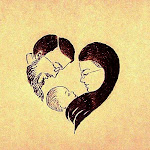Instead, Orthodox focus on the Creation. All eight days, for the day of the Resurrection, the day in which we live, is the eighth day of Creation. And it is good.
Christ's death and resurrection take care of the Fall and its problems, but His incarnation does not require the Fall. [I don't know if there are speculative Orthodox out there or no, but I would be interested to know if they think that Christ would have died and risen again had there been no Fall ... ?]
The Gospel is an invitation to share in a divine story. It is, as it was once called, possibly by Tolkien, True Myth. It is the Platonic reality to which all other myth and story are but shadows, and only succeed as story insofar as they reflect the true myth that God has been telling us since the dawn of Creation. "And God said ...."
I think, and this is probably in large part due my Protestant upbringing, that I am susceptible to the juridical approach to Christianity.
- I mustn't make God mad...
- Oh, can't sin in that way - it will annoy Him.
- I can't confess because I don't feel guilty enough.
- I'm due for hellfire now, I tell you ...
Instead, the metaphors in Scripture are of journeys. We are wayfarers and sojourners, athletes running a race, disciples following Him.
So too Liturgy and the Church year teach us that Christian life is movement, and we speak of salvation over time and the "Christian walk". All these things point to the fact that we are being called, relentlessly, constantly, lovingly, "Walk with me. Follow me. Take my yoke and come."
He wants us to journey with Him, out of love, compassion for us. And He showed He means it by coming here to live with us as Christ Jesus, to be with us, suffer with us, love us.
...
It is strange. All these words feel so familiar, so like unto things I have been taught and things I have said myself once upon a time. But they feel new upon my tongue. New and different and beautiful, not jaded, time-worn, or kitsch.
And I don't really understand it, either. It is not as if the past three months were spent in penitence and prayer. I can't claim to be terribly spiritual, then or now. Or strong. All I see is the world a little brighter, old truths made new. All I see is God walking with me, even though I'm not the best of company. ... Perhaps the only difference is that I see it.
- V.



2 comments:
When I was a youth we sang a song that is likely still sung in Evangelical churches.
"Just a closer walk with Thee, grant it Jesus is my plea,
Daily walking close to Thee,
Let it be, dear Lord, let it be."
Perhaps you know it. I still sing on occasion, in times of joy, in times of trial, as a prayer, as statement of creed. I would even say that in simple terms it is what life is about.
My father said something interesting in a discussion one day. He speculated that Adam and Eve would have been taught by God about Good and Evil eventually and that in their disobedience they learned by experience exactly what good and evil were, knowledge they would have had anyway but without having to suffer the consequences.
An interesting thought.
I can't offer any speculation on this point. But I will note that it is apparently relatively commonplace among the Fathers that the Incarnation would have occurred with or without the fall.
Panyiotis Nellas identifies this in a book whose title and other particulars escape me at the moment.....(St. Symeon the New Theologion taught pretty much what Les' father said) and George MacDonald has this to say:
"Children we were; true sons we could never be, save through The Son. He brothers us. He takes us to the knees of the Father, beholding whose face we grow sons indeed. Never could we have known the heart of the Father, never felt it possible to love him as sons, but for him who cast himself into the gulf that yawned between us.
In and through Him we were foreordained to the sonship: sonship, even had we never sinned, never could we reach without him. We should have been little children loving the Father indeed, but children far from the sonhood that understands and adores."
This breathes a whole new meaning into the words of the Forerunner "behold the Lamb of God who takes away the sin ("amartion" literally incompleteness) of the world.....
Post a Comment